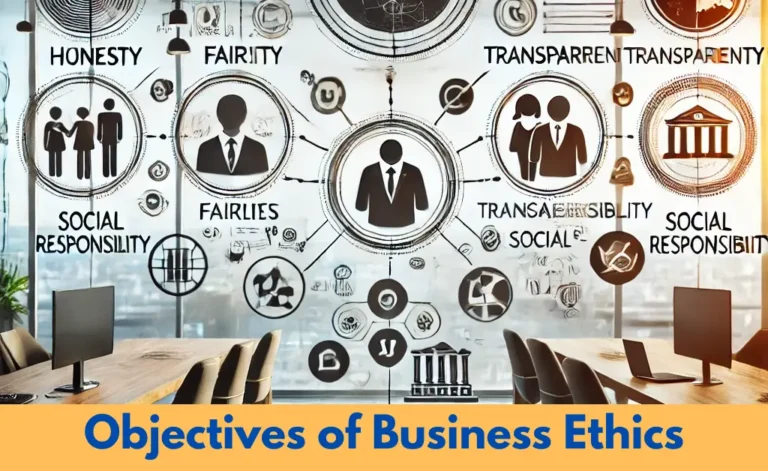Introduction
Objectives of business ethics are the rules that help companies do the right thing. These rules make sure that businesses are fair, honest, and responsible. A company that follows good ethics treats its employees well, provides quality products to customers, and helps the community.
When businesses act ethically, people trust them more, and they become successful for a long time. Ethics in business also means following laws, avoiding cheating, and caring for the environment. In simple words, business ethics help companies grow while being fair and responsible.
What Are the Objectives of Business Ethics?
The objectives of business ethics are the goals that help companies do the right things in a fair and honest way. These objectives make sure that businesses treat their employees, customers, and society with respect. Ethical businesses follow rules, avoid cheating, and make good decisions that help everyone.

The main purpose of business ethics is to create trust. When a company is honest, people believe in it and want to work with it. Another goal is to make sure businesses follow laws and protect the environment. Ethical companies also take care of their workers by giving them fair wages and a safe workplace.
By following these objectives, businesses can grow in a responsible way and earn the respect of people around them.
You May Also Visit This Links
What is a Instagram app | Complete Guide | Run Post
Real Estate Hashtags Instagram | Detail Guide | Run Post
Purple Instagram Highlight Icons | Complete Guide | Run Post
News Related to Education Sector | Detail Guide
Step-by-Step Guide to Objectives of Business Ethics
Business ethics are the rules that help a company do the right thing. They ensure that businesses are honest, fair, and responsible. Here is a step-by-step guide to understanding the objectives of business ethics.
Step 1: Be Honest and Fair
Honesty means always telling the truth. A business should never lie about its products or services. Fairness means treating everyone equally, whether they are customers, employees, or business partners. This helps a company build trust and a good reputation.
Step 2: Protect the Rights of Stakeholders
Stakeholders are the people who are affected by a business, such as:
- Employees: They should be paid fairly and treated well.
- Customers: They should get good quality products and services.
- Investors: They should receive honest financial reports.
- Society: Businesses should not harm the environment or community.
Ethical businesses always make decisions that are good for all stakeholders.
Step 3: Take Social Responsibility
A business should help society. Some ways to do this include:
- Supporting education by donating to schools.
- Helping poor people by giving food and clothes.
- Protecting nature by reducing pollution.
A responsible company makes the world a better place.
Step 4: Be Transparent and Accountable
- Transparency means sharing the truth about the business. Companies should not hide any important information.
- Accountability means taking responsibility for mistakes. If a company makes an error, it should fix it instead of blaming others.
This helps build trust with customers, employees, and investors.
Step 5: Make Ethical Decisions
In business, people often have to choose between right and wrong. Ethical decision-making means:
- Avoiding cheating or fraud.
- Saying “No” to bribery and corruption.
- Always doing what is fair and legal.
Companies should teach their employees to make the right choices in difficult situations.
Step 6: Create a Positive Workplace
A business should provide a safe and happy environment for employees by:
- Paying fair wages.
- Respecting everyone, no matter their gender, religion, or background.
- Ensuring a safe and clean workplace.
Happy employees work better and help the business grow.
Step 7: Follow the Law
Every country has rules that businesses must follow. These laws cover:
- Workers’ rights, like fair salaries and working hours.
- Product safety, so customers are not harmed.
- Environmental protection, to prevent pollution.
Following the law keeps a business safe from fines and legal problems.
Step 8: Think About Long-Term Success
Some companies focus only on making quick money, but this can lead to problems later. Ethical businesses think about the future by:
- Building strong relationships with customers and employees.
- Keeping a good reputation.
- Growing slowly but steadily.
A company that follows business ethics will succeed for many years.
Step 9: Protect the Environment
Businesses should not harm nature. They can help by:
- Using eco-friendly materials.
- Recycling and reducing waste.
- Saving energy and water.
Protecting the environment is important for future generations.
Step 10: Encourage Ethical Leadership
Leaders in a company should set a good example. Ethical leaders:
- Make fair decisions.
- Treat employees with respect.
- Follow business ethics in their own actions.
When leaders do the right thing, employees also follow the same path.
Business ethics are important for every company. By following these 10 simple steps, businesses can be honest, fair, and responsible. Companies that follow ethics gain trust, respect, and long-term success. Ethics help businesses grow in a way that benefits everyone employees, customers, society, and the environment.
Key Objectives of Business Ethics
Business ethics means doing business in a fair, honest, and responsible way. It helps companies treat people well and follow the rules. Here are some key objectives of business ethics:
1. Honesty and Fairness
- A business should always tell the truth and be fair. It should not cheat customers or lie about its products.
2. Respect for Employees
- Workers should be treated with kindness and respect. They should get fair pay and a safe place to work.
3. Customer Satisfaction
- A business should sell good-quality products and make sure customers are happy with what they buy.
4. Following the Law
- Every business must obey laws and rules. This includes paying taxes, following safety rules, and protecting the environment.
5. Social Responsibility
Companies should help society by doing good things, like reducing pollution and helping people in need.
6. Long-Term Success
- When a business follows ethics, it builds a good reputation. Customers trust the business, and it grows successfully over time.
Business ethics help companies do the right thing. When businesses are honest, fair, and responsible, everyone benefits, including customers, workers, and society.
Challenges in Following Objectives of Business Ethics
Business ethics means doing business in the right and fair way. It means being honest, following rules, and treating people well. But sometimes, it can be hard for businesses to always do the right thing. Here are some challenges they face:

1. Pressure to Make More Money
Sometimes, companies want to earn more money quickly. This can make them take shortcuts or do things that are not fair. For example, a company might sell a product at a high price even if it is not worth it.
2. Competition from Other Businesses
Businesses compete with each other to sell more products. Some companies may try to cheat or lie to get ahead. This is not fair, but it happens because everyone wants to win.
3. Keeping Customers Happy
Businesses want their customers to be happy, but sometimes they have to make tough choices. If a company cannot afford high-quality materials, they may use cheaper ones, which can make the product less good.
4. Treating Workers Fairly
Companies should pay their workers well and treat them with respect. But some businesses try to save money by paying workers very little or making them work too much. This is unfair and against business ethics.
5. Following Laws and Rules
Every business must follow laws and rules, but some companies break them to save money or time. For example, a factory may not follow pollution rules to save costs, which can harm the environment.
6. Being Honest in Advertising
Some businesses make false promises in their ads to attract more customers. For example, a company might say their product is the best, even if it is not true. This is not honest and is against business ethics.
Following business ethics is not always easy, but it is important. Businesses should be fair, honest, and kind to their workers and customers. If everyone follows ethics, businesses will be better for everyone.
You May Also Visit This Links
Host Entertainment News | Complete Gide | Run Post
Manyata Tech Park Images | Complete Guide | Run Post
Deluxe Entertainment News | Detail Guide | Run Post
RTE Education News | Detail Guide | Run Post
Advantages and Disadvantages of Business Ethics
Business ethics help companies do the right thing. Ethical businesses are honest, fair, and responsible. But following ethics has both advantages (good points) and disadvantages (challenges).
Benefits of Objectives of Business Ethics
Business ethics help companies build trust, stay fair, and grow successfully. It creates honesty, keeps customers happy, and ensures long-term success.
| Pros |
| Builds Trust and Reputation Ethical businesses gain respect from customers and employees. People trust companies that are fair and honest. A good reputation helps a business grow. |
| Increases Customer Loyalty Customers prefer to buy from honest businesses. If a company treats customers well, they keep coming back. A loyal customer base increases sales and profits. |
| Creates a Positive Work Environment Employees feel safe and happy in ethical workplaces. Fair salaries and respect make workers more productive. A happy workforce leads to better company success. |
| Avoids Legal Problems Following ethics helps businesses obey the law. It prevents fines, legal cases, and government penalties. A law-abiding business runs smoothly without trouble. |
| Helps in Long-Term Growth Ethical businesses last longer than dishonest ones. They build strong relationships with customers, employees, and society. People prefer companies that care about fairness and responsibility. |
Drawbacks of Objectives of Business Ethics
Business ethics can be hard to follow. Some companies face higher costs, slower profits, and tough decisions. But staying ethical helps in the long run.
| Cons |
| Higher Costs Ethical businesses pay fair wages and use eco-friendly materials. These things can be expensive and increase product prices. Some companies find it hard to manage these costs. |
| Slower Decision-Making Ethical businesses think carefully before making decisions. They must consider laws, fairness, and social responsibility. This can slow down business operations. |
| Competitive Disadvantage Some companies break rules to make more profit. Ethical businesses may struggle to compete with such companies. Being honest can sometimes mean losing quick profits. |
| Limited Short-Term Profits Unethical businesses may make fast money through shortcuts. Ethical companies focus on long-term success, not just quick gains. It may take time to see financial benefits. |
Common FAQs About Objectives of Business Ethics
Here are some common questions and simple answers about business ethics.
What are business ethics?
Business ethics are rules that help companies do the right thing. These rules guide businesses to be fair, honest, and responsible.
Why are business ethics important?
Business ethics are important because they build trust, keep customers happy, and help businesses grow in the right way. Ethical companies also avoid legal problems.
What happens if a business does not follow ethics?
If a business is dishonest or unfair, people stop trusting it. Customers may leave, employees may feel unhappy, and the company may face legal troubles.
Can a business make money and still be ethical?
Yes! Ethical businesses can make good profits by treating customers well, being honest, and following fair practices. In the long run, ethical businesses succeed more.
How do companies follow business ethics?
Companies follow ethics by:
Treating employees and customers fairly
Telling the truth in advertising
Following laws and rules
Helping society and the environment
Do small businesses need to follow ethics?
Yes, ethics are important for all businesses, big or small. Customers trust and support businesses that do the right thing.
What are some examples of business ethics?
A shop selling only good-quality products
A company paying fair wages to workers
A business protecting the environment by reducing pollution
Can business ethics change over time?
Yes! As society changes, business ethics also change. Companies must keep learning and improving their ethical practices.
Conclusion
Business ethics help companies do the right thing. When businesses are honest, fair, and responsible, they earn trust from customers and employees. Ethical companies follow rules, treat people with respect, and care for the environment.
Following business ethics is not always easy, but it brings long-term success. Companies that stay ethical grow stronger, avoid problems, and make a positive impact on society. In the end, doing the right thing is always the best choice for any business.
Bonus Points on Objectives of Business Ethics
Here are some extra points to remember about business ethics:
- Builds a Good Reputation: Companies that follow ethics gain respect and trust from people.
- Increases Customer Loyalty: Honest businesses keep customers happy, and they return again and again.
- Encourages Employee Honesty: When a company is fair, employees also work honestly.
- Reduces Legal Problems: Ethical businesses follow laws, so they avoid fines and legal trouble.
- Helps in Long-Term Success: Businesses that follow ethics grow steadily and stay successful for a long time.
By following business ethics, companies create a better world for everyone!
You May Also Visit This Links
Water Tech Coimbatore Sulur | Complete Guide | Run Post
A Rangoli Instagram | Step by Step Guide | Run Post
All Online Tn Education News | Complete Guide | Run Post

